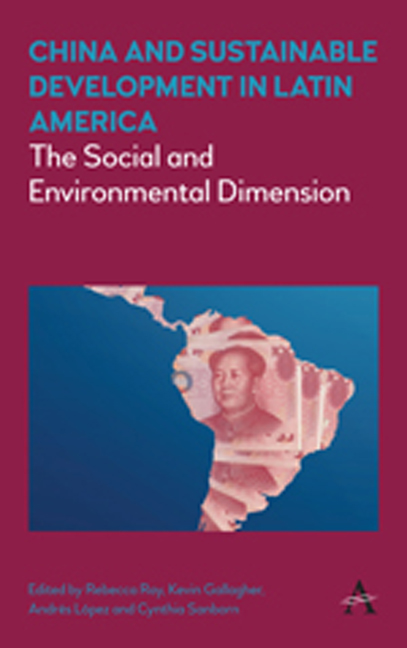Book contents
- Frontmatter
- Contents
- List of Illustrations
- Acknowledgments
- Part I INTRODUCTION AND REGIONAL OVERVIEW
- Chapter 1 China in Latin America: Lessons for South– South Cooperation and Sustainable Development
- Part II CHINA'S AND LATIN AMERICA'S HYDROCARBONS SECTORS
- Part III CHINA'S AND LATIN AMERICA'S MINING SECTORS
- Part IV CHINA'S AND LATIN AMERICA'S AGRICULTURAL SECTORS
- Part V CHINA'S AND LATIN AMERICA'S MANUFACTURING SECTORS
- Notes on Contributors
- Index
Chapter 1 - China in Latin America: Lessons for South– South Cooperation and Sustainable Development
from Part I - INTRODUCTION AND REGIONAL OVERVIEW
Published online by Cambridge University Press: 12 September 2017
- Frontmatter
- Contents
- List of Illustrations
- Acknowledgments
- Part I INTRODUCTION AND REGIONAL OVERVIEW
- Chapter 1 China in Latin America: Lessons for South– South Cooperation and Sustainable Development
- Part II CHINA'S AND LATIN AMERICA'S HYDROCARBONS SECTORS
- Part III CHINA'S AND LATIN AMERICA'S MINING SECTORS
- Part IV CHINA'S AND LATIN AMERICA'S AGRICULTURAL SECTORS
- Part V CHINA'S AND LATIN AMERICA'S MANUFACTURING SECTORS
- Notes on Contributors
- Index
Summary
Introduction
Latin America's recent commodity boom was associated with a sharp increase in social and environmental risks. The boom was largely driven by trade and investment with China and concentrated in the petroleum, mineral extraction and agricultural sectors – sectors strongly linked to environmental degradation and social conflict. With some notable exceptions, Latin American governments have fallen short of mitigating these risks and costs of the boom. While China should not be blamed for the bulk of Latin America's environmental and social problems, it would be wise to mitigate the impacts of its overseas activities to maintain good relations with host countries and to reduce the risks of international investment. Some Chinese firms have demonstrated an ability to adhere to best practices in these arenas, but overall, thus far, they lack the experience or policies to manage their impacts in the region. As the boom tapers off and Latin American economies slow down, there is increasing pressure on governments to streamline approvals for new export and investment projects, and to ignore civil society organizations working to hold governments and foreign firms accountable. It is in the interests of the Latin American and Chinese governments, as well as Chinese firms, to put in place adequate social and environmental policies to maximize the benefits and mitigate the risks of China's economic activity in Latin America.
In this context, the present study asks two research questions. First, to what extent has China independently driven environmental and social change in Latin America? Second, to what extent do Chinese firms perform differently from their domestic and foreign counterparts when they invest in Latin America? We and our colleagues have explored these questions through a series of eight country- level case studies – in Argentina, Bolivia, Brazil, Chile, Colombia, Ecuador, Mexico and Peru – laid out in the chapters that follow.
- Type
- Chapter
- Information
- China and Sustainable Development in Latin AmericaThe Social and Environmental Dimension, pp. 3 - 30Publisher: Anthem PressPrint publication year: 2017



